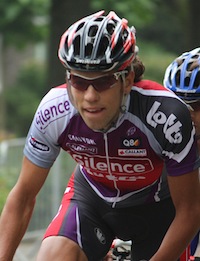 You know it’s a slow news week when word that Thomas Dekker’s urine B sample—originally tested in 2007, and initially found to have EPO three months ago—finally comes back positive, makes front pages.
You know it’s a slow news week when word that Thomas Dekker’s urine B sample—originally tested in 2007, and initially found to have EPO three months ago—finally comes back positive, makes front pages.
You know it’s a slow news week at the end of the season because the Internet is blogging and re-tweeting the story like it’s going out of style. You’ve gotta forgive the big publications for pushing the story—it’s their job, after all. But we, dear reader, should have better things to do.
Dekker was essentially fired by Rabobank for having nonsensical blood values. It should be a story of no merit that due process has run its course against him—if anything, more people should be considering that retroactive dope testing severely reduces rider incentive to go straight, instead of leaping into snide Twitter tirades against those found guilty.
Indeed, save your snide Twitter tirades for those who actually deserve it: the UCI. They’ve continued to defy transparency in denying ProTour licenses to two French squads in the midst of their Cold War against the Tour de France organizers, while giving Team RadioShack a “when we feel like it” response.
Not that I don’t think a smaller ProTour would be a good thing—along with everyone else in the sport. Ceverlo Test Team proved this season that it’s entirely possible for a Continental squad to go to top races and come back with top results, meaning that ProTour membership is largely a top-dollar luxury for teams that absolutely, positively have to get invited to every major race of the season.
Perhaps, instead of dropping and approving squads with eyebrow-scrunching whimsy—long a hallmark of their nemeses at the ASO—the UCI should develop a system of promotion and relegation, allowing squads to win their way into the top level of the sport.
It would attract smaller, regional sponsors just wanting to test the waters, and provide larger-dollar backers with ready-made, successful teams when these smaller teams are finally promoted to the ProTour level. It would also emphasize continuity between seasons, ending the chaotic fire sales that ensued following the pullout of major team sponsors like Mapei and Discovery Channel.
It might even help keep the doping problem down, by giving younger riders the chance to begin and slowly develop with lower-tier teams, without the pressure to gather the massive results needed to catch the eye of ProTour managers, or ensure future support from talent-packed top-level teams.
Certainly, the fact that Thomas Dekker’s 35th place at the ’07 Tour—at age 23—was considered something of a flop didn’t go a long way to keeping the young Dutchman clean. Had he been on Skil-Shimano or Vacansoliel instead of Rabobank, without Robert Gesink breathing down his neck, his career development might have followed a far different path. Seems* to have worked for Johnny Hoogerland .
*(it seems no one makes a splash without rumors these days.)
I heard somewhere that the 2008 Tour samples are being retested. Probably so there will be headlines in December or January.
This whole process of selection is clearly bogus and political. Much like The Olympics.
Yea, they could run a divisional system like in soccer where the top teams get promoted to the next level and the bottom teams get demoted… would make things more interesting for sure.